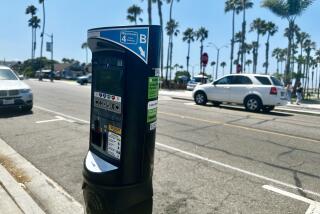‘Gold Card Desk’ dismissed some L.A. parking tickets without justification, audit finds
Approximately 1,000 Los Angeles city parking citations over a two-year period were dismissed — some without justification — through an obscure service known as the “Gold Card Desk” that allows the mayor and other elected officials to fast-track citation reviews, a new audit has found.
The service, which few outside of city government appear to know about, partly involves a plastic parking bureau “Gold Card” that is distributed to city offices. It includes a special phone number to call and on the back side notes that the holder may have an “urgent need to resolve any parking citation matter which requires special attention.” It promises “you will be immediately connected to our Gold Card Specialist.”
The program was started about 20 years ago to permit officials and their staff to expedite constituent appeals of parking tickets and possibly have fines reduced or eliminated. But auditors took issue with the service during a review of the city Department of Transportation.
City Controller Wendy Greuel, who released the report Thursday, raised the specter that some people may have received special treatment in the handling of contested tickets.
“You should not need political pull to expedite the investigation of a ticket,” said Greuel, a possible candidate for mayor. “There were no specific policies to guide the review of these citations … we believe causing a rift for inappropriate cancellations.”
Greuel’s audit said the Gold Card referral service is provided exclusively to the mayor’s office and council district offices.
Mayor Antonio Villaraigosa’s office challenged that Thursday afternoon, providing figures it had received indicating that about 90% of some 5,600 requests for Gold Card reviews came from within the transportation department and other sources in recent years, though it did include hundreds of requests from the mayor and City Council offices.
The L.A. mayor’s office also released information showing Greuel voted to approve a contract that included the Gold Card program, that she had been briefed on the program and that staff members in her office used the service while she was on the council.
Greuel said she did not know about the service until recently and that the audit’s findings — and her recommendation that the Gold Card Desk be eliminated — stood independently of any past actions.
Auditors sampled 40 dismissals involving the Gold Card Desk. Greuel said that in “90% of those cases there was not a paper trail [showing] where those original requests came from or justification for that dismissal.”
All that was found in those cases were directives from transportation department managers to reduce fines or dismiss tickets, Greuel said. Overall, Greuel said it was unclear what percentage of the dismissals were done for justifiable reasons. Her office said the investigation could not pinpoint the source of all the referrals.
Officials with the Department of Transportation defended the program’s integrity. They said the desk was created in response to elected officials’ requests to have a central point to send complaints about citations.
“It’s not intended to have any special consideration or dismissal, but rather an opportunity for an individual to be heard,” said Robert Andalon, a senior transportation department official.
He said there are two employees in charge of the Gold Card Desk, and that they act as ombudsmen. They were hired by the department’s ticket-processing contractor, Affiliated Computer Services, he said.
The transportation department’s interim general manager, Amir Sedadi, said the department plans to discontinue the program in its upcoming contract.
At a news conference Thursday, transportation department officials handed out fact sheets that included a description of the Gold Card Desk. It said “all contested citations, including those referred through the [Gold Card Desk] are reviewed using the exact same procedures.”
But, according to the audit, some of the tickets receiving expedited reviews were tossed out solely based on the violator’s self-proclaimed inability to pay — a complaint Greuel’s investigation portrayed as a dubious reason for dismissal. Some tickets were eliminated without the required paperwork. Other requests for dismissal did not include any reason at all.
The program appears virtually unknown to most ticket recipients. Dozens of those who showed up Thursday to pay citations at an enforcement office downtown said they had never heard of the service.
“I wish they did let us know about it,” said 55-year-old Donny Legans, who arrived to pay an $88 ticket. Legans then asked officials inside about the program but was told it did not exist.
“They said there is no such thing. You can’t appeal,” said Legans, who works in the air-conditioning business. “They told me: You have 30 days to pay this ticket or it will be doubled.”
Sarah Hamilton, a spokeswoman for Villaraigosa, said the mayor’s office had periodically used the program as one of many ways to help constituents.
Callers who thought they didn’t deserve certain citations are referred to the Gold Card Desk, she said, adding that the program is open to anyone, not just VIPs or insiders.
“Any resident of the city who feels they received a citation in error, or who needs a sidewalk repaired or graffiti removed can call the mayor’s office for assistance,” Hamilton said. The Gold Card Desk is a comparable “resource for constituents.”
Who else used the service remains a puzzle, even to auditors. Several council members said they had not heard of or used the program.
Councilwoman Jan Perry said that several years ago her staff was briefed about the program, but that she believed neither she nor her staff had ever used it.
Councilman Dennis Zine said he also had heard of the service but never used it and said that “if we can establish or reduce fines, that’s news to me.”
Another council member, Richard Alarcon, said someone came to his office several years ago to train his staff on the Gold Card program. He provided a memo from the city’s ticket contractor explaining that the service is only to help constituents.
“These services are only available for those who have taken their concerns regarding parking citations to the Parking Violations Bureau, but have been unable to come to a resolution based on extenuating circumstances,” the memo states.
The audit released Thursday is the second in a series of three focusing on the city transportation department. The first audit, released in April, found that the department had missed out on up to $15 million in revenues because it had gone easy on chronic scofflaws who rack up multiple unpaid parking tickets.
The new audit also found the department pays the ticket-handling contractor to process citations even when they have been voided by a traffic officer because of mistake or error. The city paid more than $440,000 in fees related to those type of voided citations during the audit period from July 2008 to June 2010.
Another finding was that the department missed out on revenue for many years because it failed to aggressively pursue collections from “protective plate holders” such as police officers, firefighters and social workers, among others.
The audit found that 30% of citations issued to protective plate holders from 2005 to 2010 had not been paid.
“Protective plates should not be used as a get-out-of-jail-free card,” Greuel said.
Sedadi said he was reviewing the audit’s findings and that the department had “already implemented many of the controller’s recommendations and have taken management actions to address some of the findings.”
Times staff writers Ann Simmons and Jean Merl contributed to this report.
More to Read
Sign up for Essential California
The most important California stories and recommendations in your inbox every morning.
You may occasionally receive promotional content from the Los Angeles Times.










